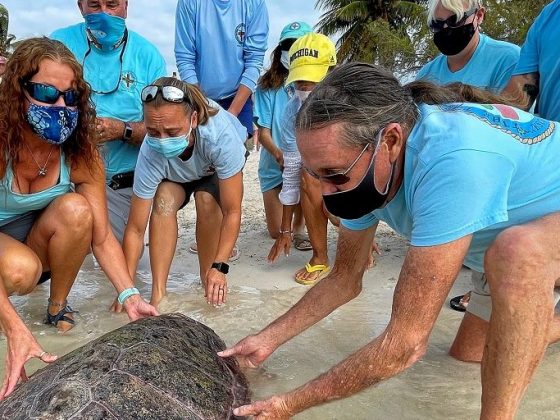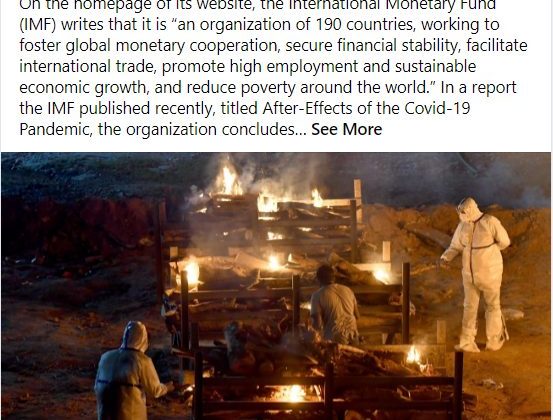As the climate crisis escalates and extreme weather is growing increasingly frequent, experts are seriously pondering how close we are to the point of no return.
CBS News reported on April 26 that according to Professor Timothy Lenton, a global leader on the climate crisis, “the West Antarctic ice sheet may have already passed a tipping point.” CBS News also spoke to other experts and reported that “their message was unanimous: Changes are happening faster than what was expected and the chance of hitting tipping points in the climate system, which just a decade ago appeared remote and far off, now seems much more likely and more immediate. ‘This is why I have been raising the alarm,’ Lenton said. ‘In just a decade the risk level has gone up markedly — that should be triggering urgent action.’”
“Once we make our social environment friendly and considerate, our nature will become friendly and considerate. Once we become friendly and considerate, we will stop being exploitative. Once we stop being exploitative, we will stop abusing each other, other living beings, and the planet as a whole. It turns out that to save ourselves and our planet, our sole focus should be on changing our social environment from hostile to friendly, from abusive to considerate. Everything else will quickly follow.”
In my view, however, the question is not whether or not we hit, or are close to hitting the tipping point. I believe that the question we should ask is not whether Earth is doomed and we’re doomed with it, but rather why are we here in the first place. The universe we live in has been around for fourteen billion years or so. Earth has existed for approximately 4.5 billion years, and life on Earth began a few hundred million years after Earth was formed. We have evolved from atoms into molecules, from molecules into unicellular creatures, and from unicellular creatures to the countless forms of life on Earth in the water, on land, and in the sky. Finally, in the last few hundred thousand years, humankind has emerged. Gradually, we have become the rulers of the planet, exploiting its soil, flora, and fauna, polluting the air, the soil, and the water, and depleting Earth’s resources as fast as we can in order to gain power and wealth. Is this why we are here, to do all this harm? Perhaps, if we knew the answer, we wouldn’t be doing the inconceivable damage we are inflicting on the planet every second. The question of our purpose in being here is therefore the key question we must answer. If we know the answer to it, we will resolve all our problems and save the planet.
Over the past several decades, we’ve tried countless tactics and ploys to curb emissions, decrease pollution, and diminish our exploitation of the planet. None of them worked. Moreover, we are not only exploiting our planet, we are exploiting all of life on the planet, and we are exploiting each other. The mistreatment of others that characterizes us is evident on all fronts, which means that the problem is far more systemic and deeply rooted than switching to renewable energy, for example, or curbing deforestation. The problem that causes all our plights is us, or more accurately our nature—human nature. Unlike any other being on this planet, we are exploitative, mean, and abusive to each other, to all living creatures, and to the planet we call home. In fact, we are so heartless that we cannot restrain our greed even when we know that our doing will ruin the future of our children and grandchildren. Instead of a home to live in, we are handing down to them a planet-size pile of trash. What good parent would do that? None, of course, but we are not good parents.
Yet, not all is lost. In the first lockdown that was imposed nearly all over the world at the beginning of the coronavirus outbreak, multiple examples of nature’s resilience from around the world proved that Earth is much stronger than we thought, and can recover even from prolonged human exploitation. Therefore, if we solve our one problem, human nature, the rest of nature will quickly recover and planetary balance will be restored.
Changing human nature may seem impossible, at first, like pulling oneself out of a swamp by one’s own hair. However, we can learn from nature how to do that. In nature, things change according to their environment. Adaptability is key to the survival of any species. If we create an environment of friendliness, mutual responsibility, and caring, our nature will adapt to its environment and will become likewise. We needn’t change ourselves, but only our superficial behavior. Then, if all of society behaves kindly, people will become genuinely kind. Just as living in a cruel environment forces everyone who lives there to be cruel, even if they are not cruel by nature, the opposite is just as true.
Once we make our social environment friendly and considerate, our nature will become friendly and considerate. Once we become friendly and considerate, we will stop being exploitative. Once we stop being exploitative, we will stop abusing each other, other living beings, and the planet as a whole. It turns out that to save ourselves and our planet, our sole focus should be on changing our social environment from hostile to friendly, from abusive to considerate. Everything else will quickly follow.
Moreover, transcoding our inherent nature will reveal to us realms we cannot conceive right now. As long as we are concentrated only on ourselves, all we see is ourselves. But the purpose of our being here is to grow far beyond ourselves, to grasp all of reality, to understand on the deepest level why we exist, why there are life and death, creation and destruction, and how everything is connected. Only if we start thinking of each other will we stop thinking of ourselves, and only if we stop thinking of ourselves will we start perceiving the world around us as it truly is. This is why the one question we should ask in order to secure our lives, the well-being of the planet, and even our happiness is “Why are we here?”











